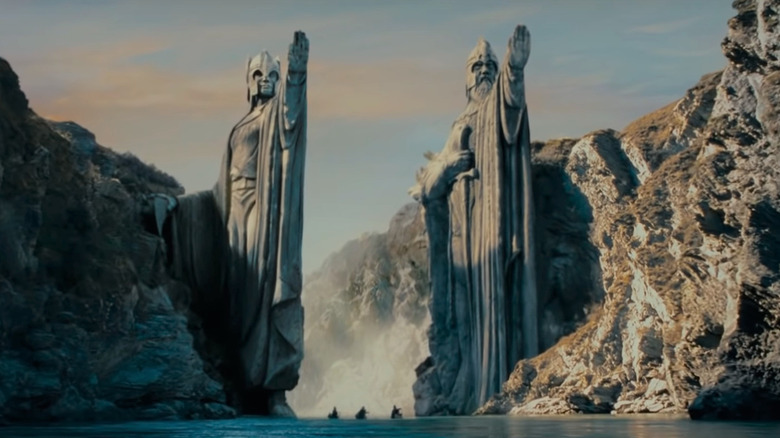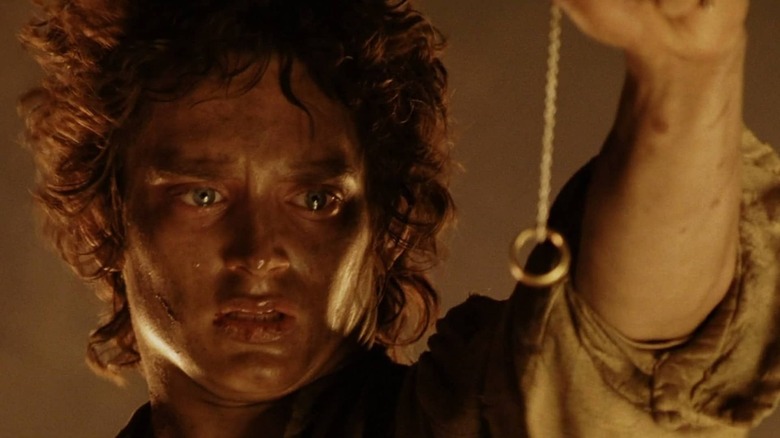Lord Of The Rings Rights Were Sold For $395 Million - What Does That Mean For Fans?
We live in a world of shocking multi-million dollar films, series, and IP acquisitions. Marvel will sink hundreds of millions in cash into a single project in the blink of an eye. HBO's "House of the Dragon" reportedly kept the company credit card set to a modest sub-$20 million per episode. Amazon Prime repeatedly made headlines over the past half-decade for its blockbuster acquisitions — not the least of which was attaining the television rights for "The Lord of the Rings: The Rings of Power." That deal alone clocked in at a staggering $250 million — and that was just for the rights to the source material.
Now a new report from Variety claims that the Swedish gaming conglomerate Embracer Group, which obtained the rights to market Middle-earth last year, has revealed its purchase price: $395 million. The eyebrow-raising sum looks big on paper, but in the context of all of this high-profile wheeling and dealing, the truth is, it could end up being the steal of the century.
The history of the right to create Middle-earth adaptations is one that goes back decades, right into the life of J.R.R. Tolkien himself. The Oxford professor sold the film and merchandise rights to his popular "The Lord of the Rings" and "The Hobbit" stories before he died. They went for a steal — just $250,000 for the lot. Yes, that's hundreds of thousands — not millions — of dollars. Sure, Tolkien retained the rights to his older then-unpublished material (things like "The Silmarillion" and "Unfinished Tales"). He also had the television rights. Nevertheless, he parted with the movie and merchandising IP in 1969 for a song. The author sold them to a group called United Artists, who resold them in 1976 to a fella named Saul Zaentz, who was operating as an independent producer.
A rights acquisition half a century in the making
When Saul Zaentz realized he was sitting on a gold mine, he formed Tolkien Enterprises (later to be retooled as Middle-earth Enterprises) and then proceeded to squat on the rights for the next 40 years. They were occasionally farmed out, as was the case for the Middle-earth animated features in the '70s and '80s. Peter Jackson also worked with the company to create his landmark trilogy.
Then, in 2022, the rights went up for sale for the first time in nearly half a decade. Embracer Group struck while the iron was hot and managed to acquire them — which was a feat in and of itself. Amazon's "Rings of Power" show was coming out, and Middle-earth was a hot commodity at the moment. It turns out, though, that the initially undisclosed sales price was an even greater surprise than the act of beating out any competition Embracer may have faced in the process. In June of 2023, nearly a year later, it was officially revealed that the organization paid a pittance, a mere $395 million, to become Middle-earth's biggest corporate owner.
Just to be clear, we're talking about the rights not just to films but board games and video games as well as other merchandising. They can even create theme parks and stage plays based on Middle-earth. It's the works, guys. Remember, Amazon paid $250 million for the television rights alone. Variety claims that previous estimates of the value of this subsequent bundle of high-profile fantasy assets could have gone for upward of $2 billion. The final price was less than one-fifth of that total.
What does Embracer plan to do with their Middle-earth rights?
Regardless of whether $395 million ultimately ends up looking like a deal, a steal, or simply a reasonable transaction, Embracer Group wouldn't have signed on the dotted line if they didn't have a plan to get the money back. That's where things could get interesting in the next couple of decades — and yes, you read that right, we're talking about decades here.
Variety relayed that the firm's annual report promised "several world-class products" set in J.R.R. Tolkien's fantasy world to be arriving in the next 20 years or so. Amazon Games has already purchased the rights to a Middle-earth MMORPG (massively multiplayer online role-playing game) that's in development. New "Lord of the Rings" movie projects have already been announced, too. Peter Jackson has shown interest in returning to the fold. Rumors of Middle-earth theme parks and stage plays aren't new, either.
Whatever form these money-making adaptations do take, it's comforting to know that the IP owners behind them aren't under the gun to make back a boatload of cash to cover their initial investment. Now that we know the numbers, chances are, Embracer Group will cover their costs quickly. Once that happens, their Middle-earth acquisition has the potential to become one of their most valuable assets to date.
And the fans? Purists and bandwagoners alike are in for a heck of a ride as Tolkien's world prepares to take on a bigger, more commercialized multi-media presence in our daily lives. The question is, will the author's creations even be recognizable in two decades, or will the free market and the need to validate pricey acquisitions have warped it into something unrecognizable? Only time will tell ...


